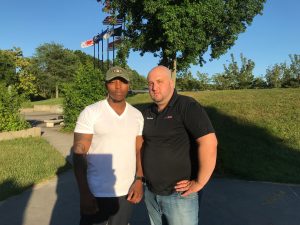
-
What Veterans Need to Know about Buying a Home
By Neil A. Carousso, Special to ConnectingVets.com and WCBS Newsradio 880
HAUPPAGE, N.Y. — Corporal DaMel Williamson (Ret.) made a common mistake about 8 years ago after he was honorably discharged from the U.S. Marine Corps and pursuing home ownership.
“I had a son in 2010. That was the next thing on my brain: I needed a house,” said Cpl. Williamson, who served active duty in Operation Iraqi Freedom and Operation Enduring Freedom where he was the senior corporal in charge of the 203 Motor-T Marines with three non-commission officers.

Cpl. DaMel Williamson (Ret.) poses for a picture at the Veterans Memorial in Suffolk County, New York. (Neil A. Carousso/Entercom) His initial mistake was getting a Federal Housing Administration (FHA) loan through a bank rather than a Veterans Affairs (VA) home loan – a benefit of which active duty veterans who serve 90 consecutive days during wartime, like Cpl. Williamson, are eligible. Other eligible veterans include those who have served 181 days of active service during peacetime, vets who served more than 6 years in the National Guard or Reserves and spouses of service members who died in the line of duty or as a result of a service-related disability.
“When you’re in the Marines, it’s just Marines,” said Cpl. Williamson who added that the was informed of his benefits, but when he sought out information, he wasn’t guided or educated on the benefits of using the VA loan rather than the FHA loan.
“He could have easily went VA, he could have easily had a lower rate, he could have easily saved the money per month by not paying the PMI (Private Mortgage Insurance),” said Michael Aharoni, who founded VetsEDU after his grandfather, an Army veteran, passed away in November 2015.
“He had the whole military funeral and something just clicked inside my head and I wanted to do something to give back to him to give back to the brave men and women that protect us every single day,” said Aharoni of honoring his grandfather’s legacy. “You fought for us, you fought for our country, you deserve the benefits that you receive.
Aharoni works from Hauppauge on Long Island, but he travels around the country teaching veterans. VetsEDU now operates in 16 states, partnering with veteran and military groups. It is the largest non-profit military real estate educational organization in the nation.
Aharoni’s goal is to pass legislation to make home buying education a requirement for veterans to protect them from realtors and banks who may not be motivated to have veterans in their best interest. He was in Washington, D.C. meeting with several members of Congress two weeks ago.
When Cpl. Williamson achieved his American Dream of home ownership, Aharoni brought him on the board of VetsEDU to educate his peers on what he mastered.

Cpl. DaMel Williamson (Ret.) and VetsEDU Founder Michael Aharoni (Neil A. Carousso/Entercom) “I just get them to understand that they are eligible and won’t be lost like I was trying to get a FHA [loan] when you have this great thing in your pocket,” said Cpl. Williamson.
Other board members include Major Gen. Marta Carcana (Ret.) who was the first Puerto Rican woman adjunct general let alone major general to serve in the U.S. Military. Major Gen. Carcana’s service spans 31 years in the Army Reserve and National Guard, with active duty in Kosovo.
“Through a mutual friend, Mr. Aharoni and I met. He told me the story, he came to Puerto Rico to visit me, to meet me, to see that I was real and that I was not a make-believe story,” said Major Gen. Carcana via Skype from her home in Puerto Rico who joined VetsEDU out of inspiration and a passion to continue serving the nation while her son is in the Puerto Rican National Guard.
“Michael gave me the opportunity to serve, to serve those that served, and what better [way] than that – not to lose contact with the people you were in contact with for 31 years, not to lose contact with what you are,” added Carcana.
“My family is my veterans and I hate to see a vet not having or don’t know,” Cpl. Williamson said of his role with VetsEDU. “When I help my vets, I know I’m doing them a good thing.”
5 Things Veterans Should Know about Buying a Home:
1. Not every bank is equal
VetsEDU Founder Michael Aharoni says banks charge fees of which veterans should not pay. He explains banks have a VA approval process and some are better than others in honoring those who served and scaling back unnecessary fees.
In addition, banks will work with vets when they are ready to purchase a home; whereas, VetsEDU begins working with veterans even a year before they are ready, educating veterans on the approval process and helping them and their families develop their budget and improve their credit scores.
2. Not every realtor is equal
Aharoni is a licensed real estate broker with the designation of MRP that stands for Military Relocation Professional. Veterans should work with realtors with that certification and experience who understand the ins and outs of the VA Loan.
3. Not every house is equal
“You cannot use a VA Loan on a co-op,” Aharoni said, adding that not every condo is VA approved. Your MRP-certified real estate broker will be able to guide you in the right direction as you begin this process.
There are minimum requirements of homes to be approved by the Department of Veterans Affairs. Aharoni says a basic rule of thumb is that homes with little renovations needed are likely to be approved.
4. You can secure a VA loan with low credit and income.
While credit and income are important in securing a loan approval, the VA Loan is “much less strict than your conventional loan,” said Aharoni who guides veterans with low credit and income meet the basic requirements and stay on top of payments with an action plan.
5a. VA Loan is the easiest to close and be accepted.
“The VA Loan is probably the fastest loan to close,” Aharoni said, adding it may only be 30-60 days before the loan closes. Veterans put no money down on the VA Loan, but some sellers ask for one to put down a good-faith deposit that will go towards the closing cost if the seller wants to see proof the veteran has the financial wherewithal to hold up his or her end of the deal.
5b. Have the right team in place!
You can learn more about VetsEDU and contact Michael Aharoni for more information through their website, VetsEDU.org.
Social Feeds

VIDEO: Told the airline to book us on the next flight out (SPONTANEOUS TRIP!)

VIDEO: The Taylor Swift Effect | WCBS Business Breakfast

VIDEO: Future of NYC | WCBS Business Breakfast

VIDEO: Reasons for New Yorkers to be Optimistic | WCBS Business Breakfast

VIDEO: NYC's AI Chatbot | WCBS Business Breakfast


